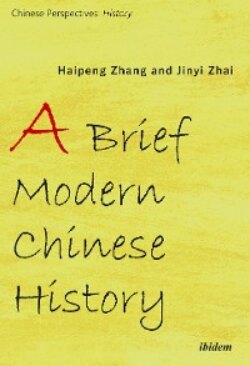Читать книгу A Brief Modern Chinese History - Haipeng Zhang - Страница 14
3. The Lost Three Decades Changes of the Central and Local Governments
ОглавлениеThe Taiping Rebellion dealt a heavy blow to Qing’s empire, as well as having a fundamental effect in changing politics in Qing’s late regime. As a result, new political groups began to emerge and the traditional pattern of political power began to transform. This change was embodied in the shift of top-down power and the increasing prominence of Han officials in the imperial court as well as in the rise of the Self-Strengthening Movement (SSM). In the fall of 1861, a palace coup took place in Beijing. In order to gain a monopoly of power, some Princes were executed and the Empress Dowager Cixi 慈禧太后 (1835–1908), who was the mother of the Emperor Tongzhi, wielded the scepter. In the following decades, Cixi was the most powerful woman in China and played a dominant role in central government politics. The Anglo-French forces left Beijing in November, 1860. The news overjoyed the Qing government as they knew that this would lead to the return of the old socio-political order. Among Qing’s ruling elites there was a consensus that the colonial powers preferred peace at gunpoint to the total collapse of the Qing empire. Yixin 奕 䜣, one of the leading ministers at this time, in one of his memoranda to the throne repeatedly emphasized this. They believed that as long as Qing abided by the unequal treaties and acted in accordance with the colonial powers’ demands, the dynasty would benefit.1
In January, 1861, Qing set up an imperial official in charge of foreign affairs—总理各国事务衙门 hereinafter referred to as Zongli yamen. He appointed several aristocrats as supervisors in his agency, which pleased the diplomats of the European powers,2 as they planned to turn Zongli yamen into one of the primary tools to control the Qing government. A British man was appointed as Inspector General of the Imperial Maritime Custom Service. Soon he was replaced with Robert Hart, also from Britain, and was in charge of Qing’s customs for more than four decades.
It was at this time that Britain, France and Russia established their embassies in Beijing. From then on, the colonial powers paid greater attention to getting the high Qing officials to recommend that China rebuild itself in light of the Western experience. Gradually, as a pro-Western ruling elite, which consisted mostly of leading aristocrats and officials such as Cixi and Yixin, came into being, the highest superintendent of Zongli yamen was created. This change was historically significant and had a decisive influence on China’s political course in the second half of the nineteenth century. The colonial powers were satisfied with the rise of Cixi and Yixin, and the top British diplomat in China in March, 1862, said that a pro-Western elite had already been in power in China and that he, to some extent, had become one of the advisers of the Chinese government.3
Aside from gaining support from the colonial powers, Qing spent his time regulating the relationship between the imperial court and the political group led by Zeng Guofan. Zeng rose to prominence at this time due to his outstanding performance in putting down the Taiping Rebellion. In the fall of 1860, Zeng was appointed the Governor General of Jiangnan and Jiangxi and in the winter, he was given the title of supreme lord in charge of military affairs in Jiangsu, Anhui, Jiangxi, and Zhejiang; and, the following January, he was awarded many more prestigious imperial titles. Thus, Zeng played a crucial role not only in defense but also in civil administration. Zeng was given free rein to rule and, as a consequence, the Zeng faction of the Xiangjun became the most powerful politico-military complex in China. It firmly controlled the armed forces, as well as the manpower and financial resources. Li Hongzhang’s 李鸿章 (1823–1901) elite community centered in the Huaijun (the Anhui Army) was similar to the Zeng faction. In the following decades, officials and generals from the two factions dominated late Qing politics. It should be pointed out that the imperial court had to allow powerful governors and generals of the Zeng and Li factions to impose and collect taxes in order for them to remain devoted to suppressing the Taiping rebels. This concession meant that the Qing government gradually lost control over local finances. Even Zeng Guofan admitted that the governors, however powerful, grew increasingly unruly.4 These governors could be likened to warlords.
Since the founding of the Qing dynasty, the Manchu sovereigns assigned only candidates of Han nationality to imperial posts. When the Taiping Army started to sweep through the south, the Manchu aristocrats had already been incapable of fighting. In order to survive the rebellion, the emperor had no alternative but to put all his hopes in the Han officials. Some enlightened Manchu princes supported this change.5 Zeng Guofan, for example, was recommended by Sushun, a member of the royal household. Cixi, the de facto supreme leader of the imperial court, assumed a very tolerant attitude toward Han officials. According to statistics, by 1864, when the Xiangjun captured Nanjing, twenty-one generals from this army were appointed governors. In fact, an increasing number of Han officials rose to prominence in imperial politics and demonstrated that the Manchu political monopoly had already been broken. Under such circumstances, some Han bureaucrats began to rethink the fate of the Manchu Qing. In a diary, one of Zeng Guofan’s closest aides said that total collapse (of Qing) might take place in less than five decades.6 Zeng himself did not disapprove of it.
